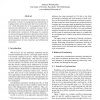Free Online Productivity Tools
i2Speak
i2Symbol
i2OCR
iTex2Img
iWeb2Print
iWeb2Shot
i2Type
iPdf2Split
iPdf2Merge
i2Bopomofo
i2Arabic
i2Style
i2Image
i2PDF
iLatex2Rtf
Sci2ools
116
click to vote
WETICE
2005
IEEE
2005
IEEE
Issues on Decentralized Consistency Checking of Multi-lateral Collaborations
Decentralized consistency checking of multi-lateral collaborations is based on propagating local information to trading partners until a fixed point has been reached. However, which information has to be propagated and how to represent this information is a challenge, because the local consistency decisions should derive consistency only if the collaboration is consistent. In this paper two scenarios are discussed arguing that history information about reaching a state must be propagated and that messages must be named uniquely in this history information to achieve the aimed equivalence of local consistency and collaboration consistency.
Related Content
| Added | 25 Jun 2010 |
| Updated | 25 Jun 2010 |
| Type | Conference |
| Year | 2005 |
| Where | WETICE |
| Authors | Andreas Wombacher |
Comments (0)

